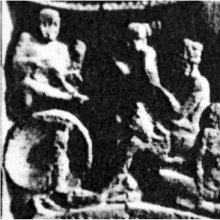Mora Jataka, Mora-jātaka: 2 definitions
Introduction:
Mora Jataka means something in Buddhism, Pali. If you want to know the exact meaning, history, etymology or English translation of this term then check out the descriptions on this page. Add your comment or reference to a book if you want to contribute to this summary article.
Images (photo gallery)
In Buddhism
Theravada (major branch of Buddhism)
Source: Pali Kanon: Pali Proper NamesThe Bodhisatta was once born as a golden peacock and lived on a golden hill in Dandaka. He used to recite one spell in honour of the sun and another in praise of the Buddhas, and thus he was protected from all harm. Khema, queen of Benares, saw in a dream a golden peacock preaching. She longed for the dream to come true and told it to the king. He made enquiries, and sent hunters to catch the golden peacock, but they failed. Khema died of grief, and the king, in his anger, inscribed on a golden plate that anyone eating the flesh of the golden peacock would be immortal. His successors, seeing the inscription, sent out hunters, but they, too, failed to catch the Bodhisatta.
Six kings in succession failed in this quest. The seventh engaged a hunter who, having watched the Bodhisatta, trained a peahen to cry at the snap of his finger. The hunter laid his snare, went with the peahen and made her cry. Instantly, the golden peacock forgot his spell and was caught in the snare. When he was led before the king and told the reason for his capture, he agreed with the king that his golden colour was owing to good deeds done in the past as king of that very city, and that he was a peacock owing to some sin he had committed. The eating of his flesh could not make anyone young or immortal, seeing that he himself was not immortal. Being asked to prove his words, he had the lake near the city dredged, when the golden chariot in which he used to ride was discovered. The king thereupon paid him great honour and led him back to Dandaka.
The story was told to a backsliding monk who was upset by the sight of a woman magnificently attired.
Ananda is identified with the king of Benares (J.ii.33 8; the story is alluded to at J.iv.414). See also Moraparitta.
Theravāda is a major branch of Buddhism having the the Pali canon (tipitaka) as their canonical literature, which includes the vinaya-pitaka (monastic rules), the sutta-pitaka (Buddhist sermons) and the abhidhamma-pitaka (philosophy and psychology).
See also (Relevant definitions)
Partial matches: Jataka, Mora.
Full-text: Moraparitta, Dandakahirannapabbata.
Relevant text
Search found 3 books and stories containing Mora Jataka, Mora-jātaka; (plurals include: Mora Jatakas, jātakas). You can also click to the full overview containing English textual excerpts. Below are direct links for the most relevant articles:
Amaravati Art in the Context of Andhra Archaeology (by Sreyashi Ray chowdhuri)
Mora Jātaka < [Chapter 3 - Amarāvatī and the Formative Stage of the Buddhist Art]
A Discourse on Paticcasamuppada (by Venerable Mahasi Sayadaw)
The Jataka tales [English], Volume 1-6 (by Robert Chalmers)
Jataka 491: Mahā-Mora-jātaka < [Volume 4]
Jataka 159: Mora-jātaka < [Book II - Dukanipāta]
Jataka 501: Rohanta-Miga-jātaka < [Volume 4]
